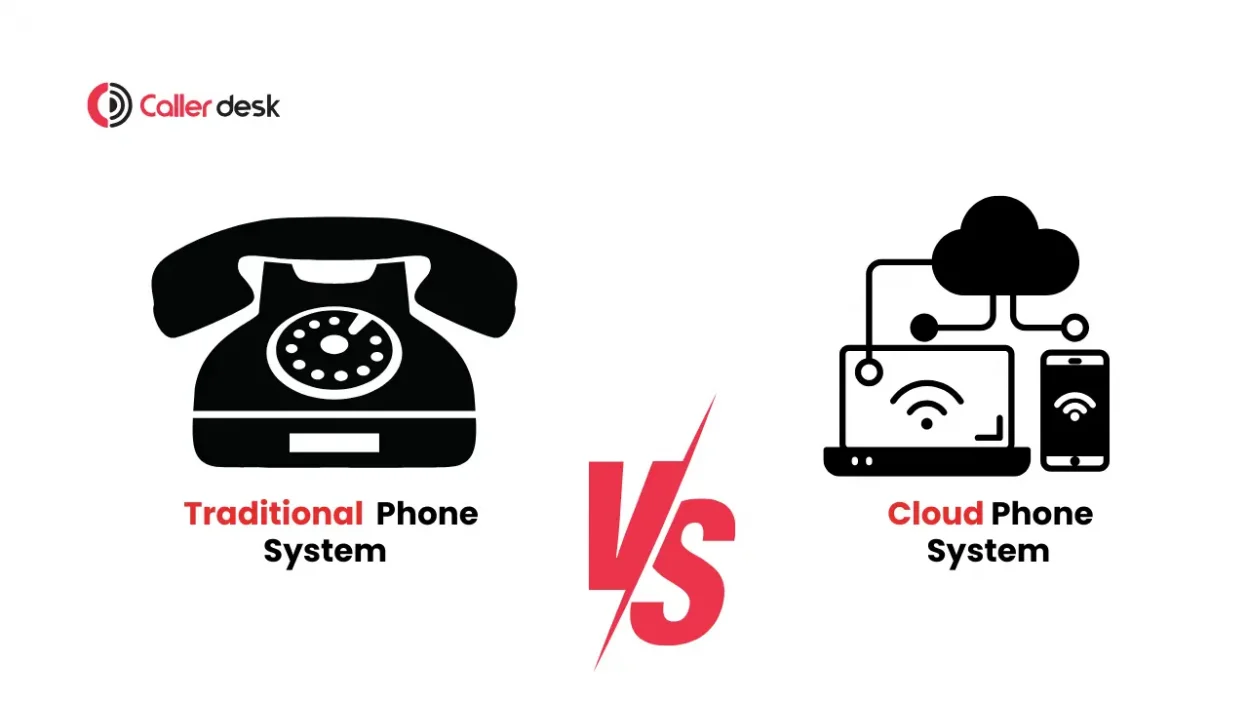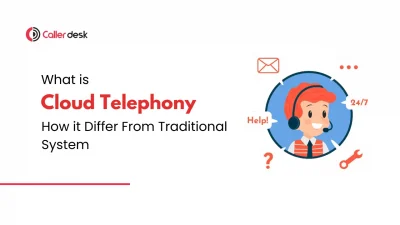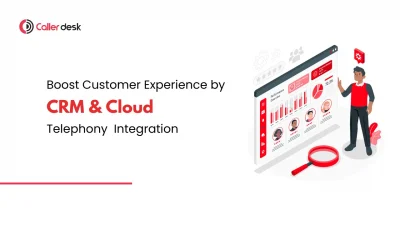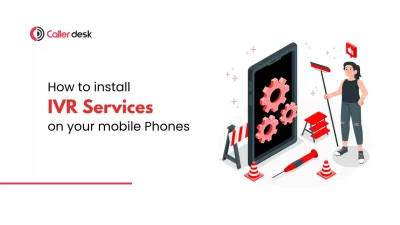Do you still use traditional phone systems to run your business?
- 1 What is Cloud Phone System?
- 2 What are Traditional Phone Systems?
- 3 Advantages of Cloud Phone Systems Over Traditional Phone Systems
- 4 Why Indian Businesses Should Consider Cloud Telephony
- 5 Key Considerations while choosing Cloud Phone Service:
- 6 How to Switch to Cloud Telephony Smoothly
- 7 Conclusion
In today’s rapidly changing market, switching to cloud phone systems is critical. These modern systems not only make your business more efficient, but they also help it grow, particularly in India, where the market is competitive and evolving.
Upgrading to better communication tools is critical. Cloud Phone System in India provides benefits such as lower costs, greater flexibility, and better features, which are ideal for Indian businesses looking to improve their operations.
In this blog, we’ll compare traditional phone systems to cloud-based services and show how cloud phones can transform the way you communicate. Let’s look at how making this change can transform your business.
What is Cloud Phone System?
Cloud telephony work by converting your voice into digital information and sending it through the internet. Unlike traditional phone systems, which use physical copper wires to connect calls, cloud systems do not require any additional hardware. The most significant advantage is their flexibility: you can easily add or remove features as your business requirements change, without having to install new equipment.
Types of Business Cloud Phone Systems
- Cloud-based PBX Systems: These online systems manage your call routing and switching. They provide useful features such as holding calls, forwarding them, and managing voicemail, all electronically.
- VoIP and Cloud IP Phone Systems: VoIP (Voice over Internet Protocol) lets you make phone calls over the internet, which can help reduce costs and improve connection quality. Cloud IP systems build on this by adding features like video calling and online conferencing.
What are Traditional Phone Systems?
Traditional phone systems, also known as landlines or analog phone systems, have been the standard in telecommunications for more than a hundred years. These systems use physical copper wires to carry voice communications from one phone to another.
Challenges of Traditional Phone Systems
- Cost Considerations: Installing a traditional phone system in India requires a significant upfront investment for hardware and wiring. Maintenance is also costly because it needs frequent attention from skilled technicians.
- Scalability Issues: Expanding a traditional phone system to support more users often involves complex and expensive upgrades, posing challenges for rapidly growing businesses.
- Lack of Advanced Features: Traditional phone systems lack key modern features such as call analytics and remote access. This limits their usefulness, particularly for businesses needing flexible work arrangements and detailed call data.
Advantages of Cloud Phone Systems Over Traditional Phone Systems
1. Cost Efficiency
- Cloud phone systems are much cheaper to set up compared to traditional systems that require expensive hardware like PBX servers and desk phones.
- They also save money in the long run by avoiding frequent hardware upgrades and reducing the need for on-site maintenance.
2. Scalability and Flexibility
- You can easily add or remove services as your business grows or changes, without needing to install new equipment.
- Cloud systems make remote work simple, allowing your team to manage calls from anywhere using their phones or laptops.
3. Advanced Features
- Cloud systems include helpful features like call routing, auto-attendants, and call recording to improve communication and customer service.
- They also connect with tools like CRMs and email platforms, making it easier to manage workflows and boost productivity.
4. Reliability and Disaster Recovery
- Cloud systems are highly reliable with built-in backups and redundancy to keep communication running smoothly.
- Even during events like natural disasters or equipment failures, your business can stay operational without interruptions.
Why Indian Businesses Should Consider Cloud Telephony
1. Cost Savings for Indian SMEs
- Reduces high costs associated with traditional phone systems, such as installation and maintenance.
- Offers affordable rates for long-distance and international calls.
- Enables cost-effective communication for businesses looking to expand globally.
2. Adaptability to Remote and Hybrid Work
- Provides the flexibility to manage calls from mobile phones or laptops.
- Supports uninterrupted communication for employees working from any location.
- Ensures smooth business operations, regardless of work setups.
3. Regulatory and Compliance Benefits
- Complies with Indian telecom regulations, simplifying adherence to rules.
- Enhances communication security and reliability, safeguarding sensitive information.
- Builds trust with customers and partners through secure and compliant communication.
Key Considerations while choosing Cloud Phone Service:
1. Pricing
- Compare costs across different providers to find a plan that fits your budget.
- Check for hidden charges, such as fees for setup, hardware, or additional features.
- Look for flexible options like pay-as-you-go plans or scalable packages to accommodate your growing business needs.
2. Features
- Ensure the service includes essential features like:
- Call Management: Forwarding, recording, and routing.
- Advanced Tools: Voicemail-to-email, conference calling, and mobile apps.
- IVR (Interactive Voice Response): To automate customer interactions and improve the caller experience.
- Verify that the system integrates with tools like CRM or analytics for added efficiency.
3. Support
- Choose a provider that offers strong customer support, including:
- 24/7 availability for technical assistance.
- Multiple channels like phone, email, and chat for quick resolutions.
- Access to resources like user guides and FAQs for self-service troubleshooting.
- Look for proactive support, such as automatic updates and system maintenance.
4. Vendor Reliability and SLAs
- Research the provider’s reputation for reliability and uptime through customer reviews or recommendations.
- Examine their Service Level Agreements (SLAs) for:
- Guaranteed uptime percentages (e.g., 99.9%).
- Fast response times for resolving technical issues.
- Compensation policies for service outages or failures.
- Confirm the provider has redundant systems and strong security to ensure uninterrupted service.
5. Scalability
- Select a provider that makes it easy to scale up or down as your business changes.
- Adding new users, lines, or features should be simple and cost-effective.
- Ensure the system can handle fluctuating call volumes during peak business periods without performance issues.
6. Security and Compliance
- Ensure the service complies with local telecom regulations and offers strong data security, such as encrypted calls and communications.
- Look for additional security features like multi-factor authentication and regular data backups.
- If your industry requires compliance with specific standards (e.g., GDPR or HIPAA), confirm that the provider meets these requirements.
By focusing on these factors, you can confidently choose a cloud phone service that fits your needs, budget, and long-term goals.
How to Switch to Cloud Telephony Smoothly
1. Plan Ahead:
- Decide what you need from your new phone system.
- Make a checklist of features you want.
2. Choose a Reliable Provider:
- Look for a trusted cloud phone service provider.
- Compare prices and read reviews.
3. Prepare Your Team:
- Inform your team about the upcoming change.
- Schedule training sessions to help them learn the new system.
4. Test the New System:
- Run a trial to check how the new system works.
- Before completely moving over, ensure that everything is properly configured.
5. Gradually Make the Switch:
- Start by moving a few lines or departments to the new system.
- Address any issues and ensure everything runs smoothly before transitioning fully.
6. Provide Ongoing Support:
- Offer continuous support to your team during and after the switch.
- Have a designated person or team in charge of dealing with any difficulties.
7. Monitor and Adjust:
- Keep track of the new system’s performance.
- Make any necessary adjustments to improve functionality.
Conclusion
Switching to cloud telephony brings significant benefits like cost savings, scalability, and advanced features that enhance business communications. This strategic upgrade is crucial for Indian businesses seeking to boost operational efficiency and growth.
At Caller Desk, we’re here to support your smooth transition. Contact us for more details and take advantage of our free consultation or trial to discover how our cloud phone solutions can propel your business forward.





